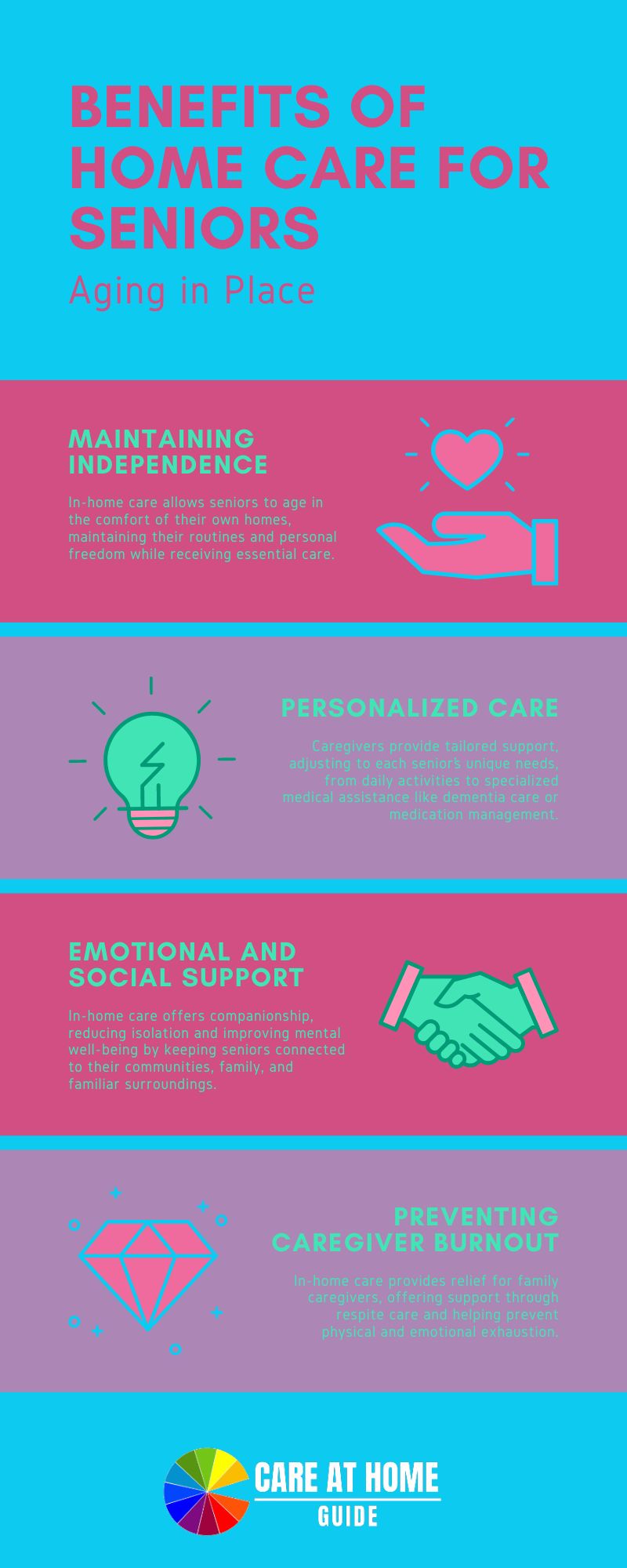
Why Aging in Place Is a Smart Choice
As our loved ones grow older, ensuring their health, comfort, and overall quality of life becomes a top priority. For many families, the choice between a senior living facility and in-home care can be difficult. However, more and more seniors and their families are discovering the numerous benefits of choosing in-home care, which allows seniors to remain in the comfort of their own homes while receiving the personalized care they need. Aging in place is becoming an increasingly popular option, and for good reason.
In this blog, we’ll explore the many advantages of home care for seniors, from maintaining independence to receiving personalized attention, as well as how in-home care can offer both physical and emotional benefits.
Maintaining Independence and Comfort
One of the greatest advantages of in-home care is that it allows seniors to remain in a familiar and comfortable environment. Aging in place means continuing to live in the home they’ve known for years, surrounded by personal belongings, cherished memories, and a sense of security. The emotional and psychological benefits of staying at home cannot be overstated. A home provides a sense of belonging and identity that is difficult to replicate in an unfamiliar environment.
This senior home care option empowers elderly individuals to maintain a level of independence that is often lost when moving to an assisted living facility. With in-home care, seniors can still manage their routines and preferences while receiving the help they need. Whether it’s deciding when to wake up, what meals to eat, or what activities to engage in, home care respects their personal choices, which can improve their overall well-being and happiness.
Personalized Care Tailored to Individual Needs
Another significant benefit of in-home care is the highly personalized attention that seniors receive. Professional caregivers provide one-on-one care, which means they can tailor their services to meet the specific needs and preferences of the senior. This is especially beneficial for individuals with chronic health conditions such as heart disease, diabetes, or mobility issues. Whether your loved one requires assistance with daily tasks like bathing and dressing, or more complex medical support such as medication management, in-home caregivers can adjust their approach to suit these needs.
Dementia care or Alzheimer’s care is another area where personalized, in-home support shines. Seniors with cognitive impairments often benefit from staying in familiar surroundings, which can reduce confusion and anxiety. In-home caregivers trained in managing dementia symptoms can help provide structure, safety, and companionship, all while reducing the stress that comes from adjusting to new environments.
Emotional and Social Benefits
Isolation and loneliness are common challenges faced by seniors, especially those who live alone or are separated from their families. One of the key emotional benefits of this is the companionship that comes with it. Caregivers provide not only physical support but also emotional support by offering a listening ear, engaging in conversation, and spending quality time with the senior.
Additionally, by staying in their own home, seniors are more likely to remain connected to their local community, family, and friends. Aging in place allows seniors to continue their usual social activities, whether it’s attending church, visiting with neighbors, or simply enjoying time with loved ones. This social connection is crucial for maintaining emotional health, which can, in turn, have positive effects on physical health.
Reducing the Risk of Caregiver Burnout
Caring for an aging parent or loved one can be a demanding responsibility for family members. While many families want to provide care on their own, the reality is that it can lead to caregiver burnout, a condition characterized by emotional, mental, and physical exhaustion. In-home care services can help alleviate this burden by providing the support family caregivers need.
Utilizing respite care services, for example, can allow family members to take a break, knowing their loved one is in capable hands. Whether for a few hours or a few days, professional home caregivers can step in and provide care, allowing family members to focus on their own health and well-being. This can prevent burnout and ensure that families are able to maintain a positive, healthy relationship with their elderly loved ones.
Safety and Security at Home
Aging at home may seem risky for seniors who have mobility issues or chronic health conditions, but with the right home safety measures, it can actually be a safer option. In-home caregivers can assist with fall prevention by ensuring the home is free of hazards such as loose rugs, poor lighting, or cluttered walkways. Additionally, caregivers can provide help with mobility, making sure that seniors move safely from room to room.
For those with serious medical needs, home health care offers another layer of security. Trained caregivers can monitor health conditions, assist with medical devices, and administer medications to ensure proper care. This reduces the risk of hospitalization or complications, allowing seniors to receive the medical attention they need in a familiar and comfortable environment.
Cost-Effectiveness of Home Care
Many families are concerned about the costs associated with senior care, and it’s often assumed that assisted living facilities or nursing homes are the only viable option. However, in-home care can be a more cost-effective solution. Because the care is personalized and tailored to the specific needs of the senior, families can choose the level of support required, which may range from a few hours of help each day to 24-hour home care.
Moreover, seniors who receive care at home are less likely to suffer from infections or illnesses that can spread in institutional settings, potentially reducing medical costs over time. Additionally, the flexibility of in-home care allows families to adjust services based on changing needs, making it a financially viable option for many.
Peace of Mind for Families
Ultimately, choosing in-home care for a senior loved one offers peace of mind for families. Knowing that a trained and compassionate caregiver is looking after their loved one’s needs can relieve much of the stress and anxiety that comes with caregiving. Family members can be confident that their loved one is receiving high-quality care, while also maintaining their independence and comfort.
Conclusion: The Best Choice for Aging Loved Ones
In-home care offers a range of benefits that make it an excellent choice for many seniors and their families. From maintaining independence and personal comfort to receiving personalized care and preventing caregiver burnout, the advantages are clear. In-home care not only enhances the quality of life for seniors but also offers emotional, physical, and financial benefits for the entire family. If you’re considering care options for your loved one, it is a solution that allows seniors to age with dignity, in the place they call home.
Resources:
- Home Care Services for Seniors: Aging in Place – HelpGuide.org
- The Benefits of In-Home Care for Seniors – Consumer Directed Choices
- About In-Home Care Services – Homewatch CareGivers

